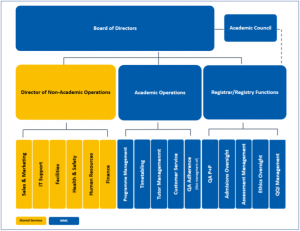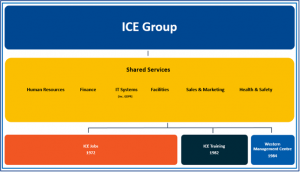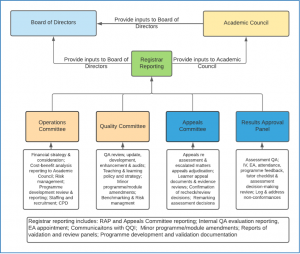Quality Assurance Handbook
The Leading Health & Safety and Business Training Provider in the West of Ireland.

Our QA Manual
Please select the section of the Quality Assurance Manual you wish to view.
Section 2 - Governance & Structures for WMC
Section 3 - Documented Approach to QA
Section 4 - Programmes of Education & Training
Section 5 - Staff Recruitment, Management
Section 6 - Teaching and Learning
Section 7 - Assessment of Learners
Section 8 - Support for Learners
Section 9 - Information & Data Management
Section 10 - Public Information & Communication
Governance and Structures for Western Management Centre
2.1 Governance and Structures for Western Management Centre
The governance infrastructure at Western Management Centre (WMC) has been established to ensure that the Centre is governed and managed effectively, with clear and appropriate lines of accountability for associated responsibilities. Through the application of its governance model, WMC ensures that objective oversight is in place to ensure that the Centre is financially sustainable, and that financial management is sound. The governance model also clearly distinguishes between the institution’s financial policy and the safeguarding of the quality and standards of its academic provision.
The governance structure at WMC has been designed to ensure quality in the educational and training service provided to all learners, including mechanisms to encourage continuous improvement in the management of quality. The quality assurance (QA) structure underpins the Centre’s approach to realise its commitment to quality. While the Registrar has overall responsibility for the quality assurance in WMC, all staff members are key players in the development and implementation of QA. Collective responsibility is achieved through this approach.
Learners are represented on specific committees and are a key part of the QA process of the Centre. WMC recognises that the participation of learners is a fundamental aspect of the QA process and therefore promotes learner engagement throughout the centre. WMC values the learner perspective as a means of facilitating the enhancement of the learner experience and improving quality.
Through a cycle of planning, implementation and review, a process of continuous quality improvement is being established across the Centre. This process is interactive and collective, based upon a core structure of relevant but active committees and stakeholders (both internal and external) carrying out the procedures outlined throughout this Handbook.
Accurate, effective, and timely communication among all WMC stakeholders is core to the effective operation of the Centre. At the heart of this are effective QA and organisational structures.
2.1.1 Overall Governance Infrastructure
The Centre’s overall governance infrastructure facilitates a clear delineation between the academic and commercial parts in the governance structure. This structure is in place to ensure that the academic decision-making processes (relating to the provision of education and training to learners) is independent of commercial considerations or the undue influence of the business owners.
WMC has appointed an Academic Council which represents the pinnacle of an academic governance architecture underpinned by a limited number of relevant committees and units reporting to it.
The role of Centre Director will be filled by the Managing Director of WMC. A Programme Manager, Registrar, and Director of Non–Academic Operations (DNAO) will provide significant levels of support to the Managing Director. The Programme Manager and Registrar report directly to the Managing Director. The Centre’s organisational structure is provided in Figures 1 and 2.

Figure 1 – Western Management Centre Organisational Chart

Figure 2 – ICE Group Organisational Chart
Academic Council
The Academic Council has delegated responsibility from the Board of Directors for academic matters, including all QA policies and procedures necessary to maintain and enhance the academic standards and teaching quality of all programmes of study at the Centre. The Academic Council is the ultimate academic authority within the Centre. The Academic Council is chaired by an external independent senior education expert. This appointment ensures that WMC is current, compliant, and relevant in all aspects of academic performance.
The Academic Council terms of reference (Appendix 1) cover all areas of academic and tutor performance, as well as taking Centre and learner inputs relating to the overall quality of service delivery. The Academic Council ensures that:
- Academic policies relating to teaching, learning and assessment as per the award standard are constantly reviewed and consistently applied across all programmes
- Learners receive a high-quality academic experience whilst studying at the Centre
- Only QQI programmes which are approved by the Academic Council may be offered by the Centre. It will in effect act as guarantor of quality for those programmes for which QQI awards are made
- Oversee the process of revalidation of programmes in line with requirements of QQI
The Academic Council works closely with the Registrar in ensuring that the QA procedures and processes as outlined in this Handbook are current, adhere to best practice, and ultimately ensure a high-quality learner experience is delivered by the Centre to the best of its abilities.
Board of Directors
WMC’s legal entity is that of a registered company limited by guarantee in Ireland. The Board of Directors govern the operation of the company as a commercial, for-profit organisation.
The main roles and responsibilities of the Board of Directors are to:
- Govern the Centre and company based on strategic goals and objectives agreed through the committees of the evolving WMC QA structure
- Ensure the financial viability of the Centre from year to year
- Act in the most ethical interests of the Centre stakeholders, particularly with protection of enrolled learners’ policy and ensuring learner care is a priority
- Submit final accounts for financial and performance audit on an annual basis
- Approve annual financial budgets and setting salary levels on an annual basis
- Maintain corporate and legal responsibility of the Centre
The Managing Director provides operational leadership for the Centre. The Managing Director controls and directs the activities of the Centre and has overall responsibility for the executive management of the Centre.
The Managing Director is identified as the designated officer with responsibility for ensuring that the Centre complies with relevant statutory, regulatory, and accreditation agencies.
The Managing Director is supported in this role by the Programme Manager, the Registrar, and the Director of Non-Academic Operations who each carry responsibility for leading or managing policy development and service delivery in their respective areas.
The Managing Director may attend such and every committee meeting as deemed necessary.
Responsibilities:
The Managing Director has ultimate responsibility to:
- Provide leadership to the academic community of the Centre to ensure that it is enabled to develop and fulfil its potential as a provider of further education and training
- Lead administrative, financial, HR, and other activities for the overall delivery of a quality service to stakeholders – learners, staff, and other stakeholders
- Put in place a management structure which:
- Develops and implements policies and programmes which place the learner experience at the heart of the Centre and ensures that WMC is the destination of choice for learners across the disciplines that the centre operates in
- Develops and keeps under review operational and QA structures and processes to ensure that the resources of the Centre are enabled to play a full role in the delivery of its strategic goals and into the development of all programme offerings
- Ensures that QA processes and practices comply with the regulations and requirements of all relevant statutory, regulatory, and accreditation agencies
- Leads the development and delivery of a strategy, framework, and processes through which the Centre prioritises and manages its strategic development opportunities
Programme Manager
Reporting to the Managing Director, the Programme Manager has overall responsibility for the operational management of the programmes provided in the Centre. The Programme Manager leads, manages, and directs an academic team comprising of tutors in relation to sound academic delivery and to the continuing development of programmes.
Responsibilities:
The responsibilities of the Programme Manager are primarily between providing academic leadership and direction, and the management of resources. Specifically, the responsibilities of the Programme Manager are to:
- Provide academic and support services in the Centre to deliver a learner-focused experience
- Assume responsibility and accountability for the day-to-day academic operations of the Centre
- Support learner recruitment, open days, and other activities such as graduation
- Encourage excellence in teaching, learning, research, and professional activities within the Centre
- Facilitate the collection of learner feedback and the resultant implementation on matters arising from that feedback as appropriate
- Ensure feedback responses are issued to learners in an agreed timeframe
- Provide orientation and guidance to all staff in the faculty
- Ensure the appropriate teaching, learning, and assessment strategies are implemented and that modules are taught and assessed in accordance with the Approved Programme Schedule
- Coordinate assessment submission deadlines to ensure an appropriate learner workload
- Ensure all assessments/exam papers for modules on the programme(s) are written and moderated sufficiently in advance of the assessment/examination taking place
Registrar
Reporting to the Managing Director and supporting the Academic Council, the Registrar will promote a quality culture throughout the Centre. This will be achieved by ensuring the appropriate academic standards are established and embedded and processes are in place for monitoring their application. The promotion of quality culture will also occur through setting of criteria for review and evaluation and pursuing appropriate action if there are any deviations from set standards.
Responsibilities:
The responsibilities of the Registrar are to:
- Act as the QA gate-keeper as required to support the FET framework, and the distribution/delegation of decision-making through the organisation, including the facilitation of escalation in relation to academic decisions
- Ensure the Centre has appropriate systems and mechanisms to track and support learner progress and safeguard data, compliant with relevant legislation
- Devise academic policies, standards, processes, and procedures, to ensure all learner and academic related processes are fair, robust, and transparent; are compliant with statutory frameworks and legislation; and are cognisant of awarding body regulations
- Manage the Centre’s document control system throughout the documentation lifecycle
- Organise, chair or attend appropriate internal committee meetings and external meetings on quality assurance
- Liaise between internal committees, Academic Council and Board of Directors
- Provide documentation inputs to Academic Council and Board of Directors
- Adhere to relevant external awarding body QA processes
- Ensure there are current and appropriate QA policies and procedures in place and implemented
- Safeguard the integrity and currency of programme validation and awards, including compliance with the terms and conditions of programme approval and the requirements and regulations of accrediting bodies for ongoing provision of delivery
- Ensure that examination/assessment standards are reviewed and maintained, through the oversight of the operation of the exams/assessment function, including exam sitting, External Authenticators, and action Results Approval Panel decisions
- Liaise with accreditation agencies on matters such as validation requests, reviews, and reporting arrangements
- Establish a culture of quality in QA standards, operational guidelines, programme content, and self-evaluation.
Tutors
Tutors are responsible for the professional and effective delivery and assessment of programmes.
Responsibilities:
The responsibilities of the Tutors are to:
- Deliver teaching with a key focus on a learner-centred approach. Tutors are encouraged to adapt innovative teaching methods and implement new technologies with their delivery
- Assess learners and provide support with respect to assessment as indicated in the relevant programme schedule
- Integrate relevant research and practical industry examples into the programme delivery and the assessment processes (where applicable)
- Contribute to the development, planning and implementation of a high-quality curriculum
- Grade assessments and provide quality feedback and mentoring to learners within the agreed timescales of assessment activities.
- Liaise with administration, management, and other staff involved in the programme (as assigned by the Centre)
Committees:
The Centre, whilst small in size, has recognised the need to appoint or develop committees to deal with relevant matters as they arise. Committees are organised to support the quality of separation and independence of decisions while at the same time, meeting the size, scope and environment of the Centre (see Figure 3). Committee structure includes suitably qualified and experienced internal employees and external experts where appropriate to support the Centre governance structure and provide the required expertise to guide informed decision-making processes. The Centre has identified the following committees as important in ensuring optimal operational and quality assurance requirements are addressed in a fair, transparent, and ethical manner.
Operations Committee
The Operations Committee oversees the strategic and operational running and development of the organisation. The Committee monitors the impact of risk and decides on associated management responses depending on the level of risk which applies at a given point in time. This facilitates the development of Centre-strategic planning and the subsequent communication of Centre strategy to our stakeholders. The Operations Committee terms of reference (Appendix 2) outlines the specific duties of the Committee.
Quality Committee
The Quality Committee manages the continued maintenance, implementation, review and enhancement of the Centre’s Quality Assurance (QA) system, and associated policies, procedures and activities.
The Quality Committee terms of reference (Appendix 3) additionally covers all areas of academic and tutor performance, as well as taking learner inputs and other inputs relating to the overall quality of service delivery.

Figure 3 – WMC Governance and Reporting
Appeals Committee
The Appeals Committee specifically manages learner appeals. The Appeals Committee terms of reference (Appendix 4) covers appeals of examination and assessment grades or other escalated matters to reach a decision on the outcome of any such appeal. The Committee will work to grant appeals where specific criterion is met.
Results Approval Panel
The Results Approval Panel (RAP) will convene to consider the formal approval of learners’ results. The RAP will include independent training professional – seconded from non-associated Internal Training Sections or, if required, a Subject Matter Expert to further safeguard the validity of assessment decisions. The RAP terms of reference (Appendix 5), is based in the outcomes of the assessment and authentication (including internal verification and external authentication) process.
Stay Up To Date
Join Our Mailing List Today - Get The Latest Industry Insights & First Look At The Newest Upcoming Training Courses.
GET IN TOUCH
Our Training Team are on hand to assist you with course enquiries, bookings, or scheduling development opportunities.
CALL US
EMAIL US
VISIT US
Galway Business Park, Dangan,
Galway, Ireland.